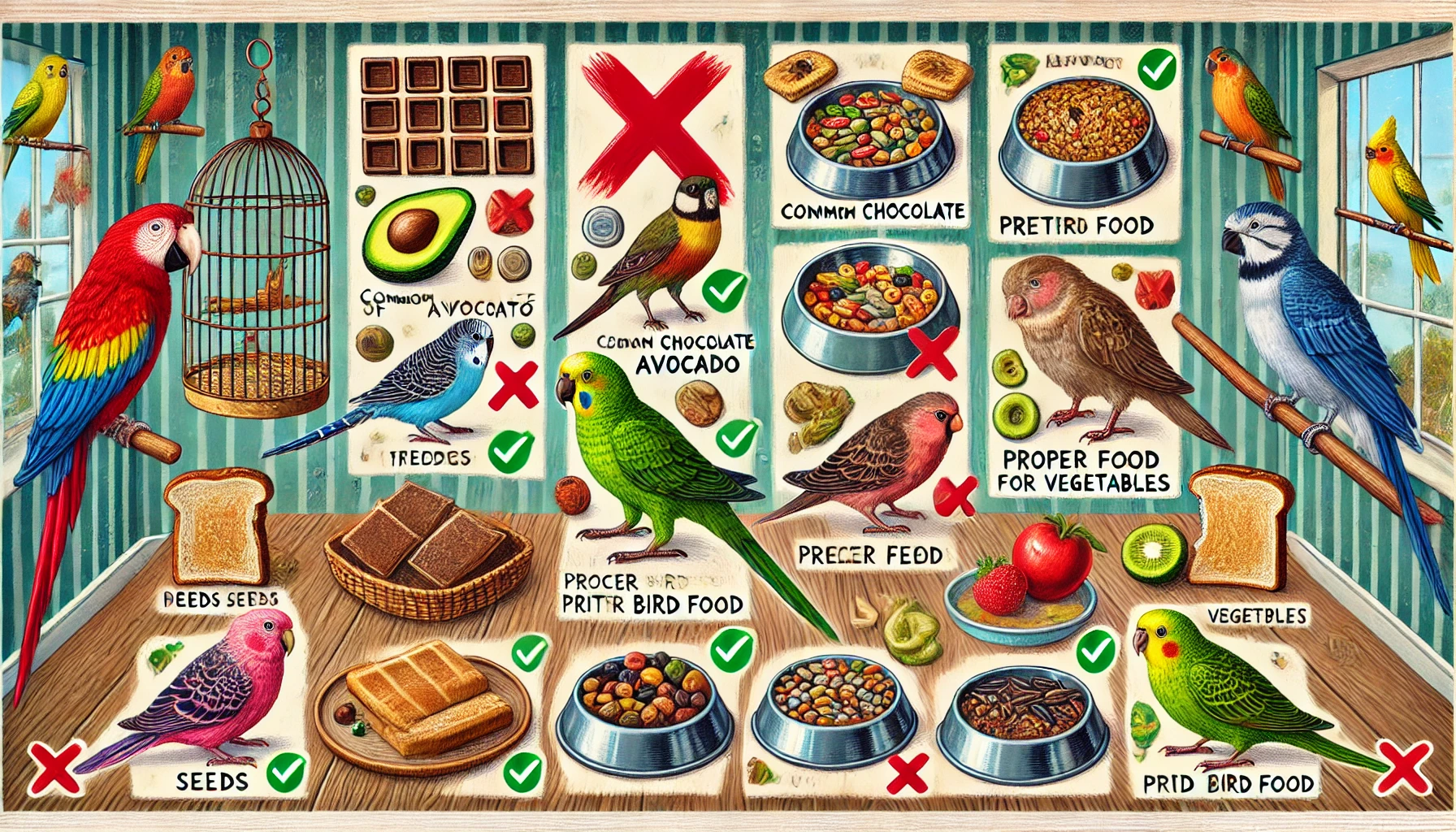Feeding Only Seeds: Why Variety Matters
One of the most common mistakes is relying solely on seeds as the primary food source. While seeds are a natural part of many birds’ diets, they can’t provide all the essential nutrients your bird needs to thrive as bird food.
Risks of a Seed-Only Diet:
- Nutritional Deficiencies: Seeds lack key vitamins like A and D and are low in calcium.
- Obesity: Many seeds are high in fat, which can lead to weight gain in pet birds.
- Limited Enrichment: A monotone diet doesn’t engage your bird or mimic its natural feeding behavior.
What to Include in a Balanced Diet:
- Pellets: Formulated to include a range of nutrients.
- Fresh Foods: Fruits, vegetables, and leafy greens.
- Occasional Seeds: Treat seeds as a supplement rather than a staple.
Offering a variety of foods ensures that your bird receives the best foods for birds, promoting longevity and vibrancy.
Ignoring Species-Specific Diets
Not all birds are the same, and their diets shouldn’t be either. A common mistake is feeding every bird the same food, regardless of its species or unique nutritional requirements.
Understanding Species-Specific Needs:
- Parrots: Thrive on a mix of pellets, fruits, vegetables, and occasional nuts.
- Canaries and Finches: Prefer seed mixes supplemented with greens and fortified pellets.
- Cockatiels: Require a balanced blend of seeds, pellets, and fresh vegetables.
Tailoring Your Bird’s Diet:
Research your bird’s species and consult a veterinarian to ensure you’re meeting their specific dietary needs. For instance, while parrots enjoy a variety of fruits, some finches might prefer sprouted seeds and small grains.

Overlooking Fresh Foods
Many bird owners underestimate the value of fresh foods, sticking to commercial bird food exclusively. However, fresh produce is an essential component of a bird’s diet.
Benefits of Fresh Fruits and Vegetables:
- Nutrient Boost: Fresh foods are rich in vitamins and minerals.
- Hydration: Many fruits have high water content, which helps keep your bird hydrated.
- Mental Stimulation: Exploring different textures and flavors keeps birds engaged.
Safe Fresh Foods:
- Fruits: Apples (without seeds), bananas, berries, and papaya.
- Vegetables: Spinach, carrots, broccoli, and zucchini.
Foods to Avoid:
Certain foods, like avocado, chocolate, and onion, are toxic to birds. Always double-check before introducing new items.
Improper Portion Sizes
Feeding your bird too much or too little can lead to serious health issues. Portion control is crucial, but many pet owners struggle to determine the right amount.
Signs of Overfeeding:
- Weight gain or obesity.
- Uneaten food accumulating in the cage.
Signs of Underfeeding:
- Weight loss or lethargy.
- Increased aggression or begging behavior.
How to Get It Right:
- Consult feeding guidelines provided by your bird food brand.
- Monitor your bird’s weight regularly and adjust portions as needed.
Providing the right amount of food ensures your bird stays healthy and energetic without wasting resources.
Not Using Quality Bird Food
Another common mistake is compromising the quality of commercial bird food. While affordable options can be tempting, some products lack nutritional value or contain harmful additives.
How to Choose the Best Bird Food:
- Read Labels: Look for products with natural ingredients and minimal fillers.
- Avoid Artificial Additives: Dyes and preservatives aren’t necessary for bird food.
- Look for Fortified Options: Foods enriched with vitamins and minerals are ideal.
Investing in high-quality birds food ensures your pet gets the best nutrition possible, supporting long-term health.
Skipping Food Hygiene Practices
Cleanliness is often overlooked but plays a crucial role in your bird’s overall health. Unclean feeding dishes or old food can harbor bacteria and mold, leading to illness.
Best Hygiene Practices:
- Daily Cleaning: Wash food and water dishes daily with warm, soapy water.
- Fresh Food Rotation: Remove uneaten fresh food within a few hours to prevent spoilage.
- Proper Storage: Store bird food in airtight containers to keep it fresh and pest-free.
Maintaining a clean feeding environment reduces the risk of infections and ensures your bird enjoys its meals safely.
Conclusion: Feeding Birds with Care and Confidence
Feeding pet birds goes beyond simply filling a dish with seeds. By avoiding common mistakes—such as over-relying on seeds, ignoring species-specific needs, or neglecting fresh food—you can provide a well-rounded diet that supports your bird’s health and happiness.
At Kwikpets, we understand the importance of quality nutrition and offer a range of premium bird foods, including fortified seed mixes, pellets, and treats. With the right tools and knowledge, you can ensure your pet bird thrives in every aspect of its life. Explore our collection of bird supplies today to give your feathered friends the care they deserve!
